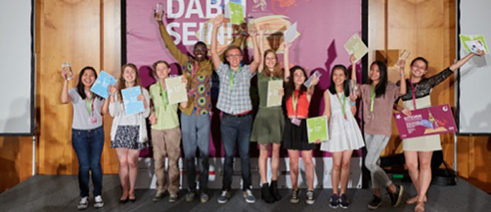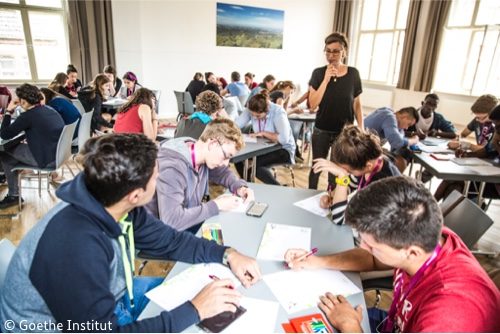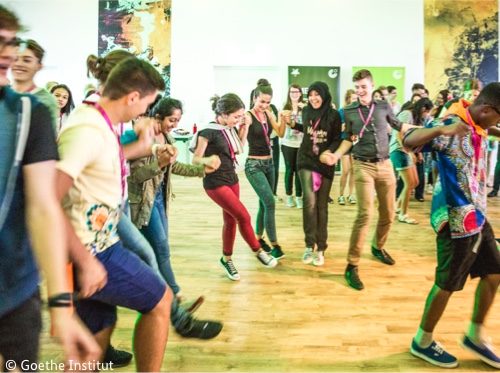International German Olympics
Final held in the Weltsaal at the Federal Foreign Office

For two weeks, the participants have been bravely battling their way through adjective declensions and nominal constructions – but above all, they have proved their intercultural skills and made friends from all over the world. A ceremony was held at the Federal Foreign Office on Friday (29 July 2016) to pay tribute to the participants and winners of this year’s International German Olympics.
From Brazil to Sweden and from Japan to Cameroon – 125 young people from over 60 countries around the world travelled to Berlin at the invitation of the Goethe-Institut. The International German Olympics is the largest German-language competition in the world. The aim is to share enthusiasm for the German language and German culture and to meet young people from all over the world. In this way, German becomes the basis for mutual understanding between different cultures.
Antonio Andrić from Croatia, Mariia Melnik from the Russian Federation and Ngoc My Nguyen from Viet Nam won first prize in the competition’s three language levels, while Amadou Diop Diagne from Senegal was awarded the fairness prize for particularly cooperative conduct and solidarity with others. Michael Reiffenstuel, Director for Cultural Relations Policy at the Federal Foreign Office, congratulated the winners and participants on behalf of Foreign Minister Steinmeier.
Largest German-language competition in the world
 © Goethe-Institut
Over the past week, the 125 young people worked extremely hard on their presentations, learned more about life in Germany from talks with other people, and presented the findings of their research in various forms to an international jury made up of German teachers. There were team and individual presentations for the three language levels (A2, B1 and B2). Teamwork skills and creativity played an important role in the choice of winners. In all of the tasks, the main topics were Berlin and its residents and the cultural differences between Germany and the participants’ own countries. The results could be seen in the form of creative and intelligent wall newspapers, theatre sketches, lyrics and photographs.
© Goethe-Institut
Over the past week, the 125 young people worked extremely hard on their presentations, learned more about life in Germany from talks with other people, and presented the findings of their research in various forms to an international jury made up of German teachers. There were team and individual presentations for the three language levels (A2, B1 and B2). Teamwork skills and creativity played an important role in the choice of winners. In all of the tasks, the main topics were Berlin and its residents and the cultural differences between Germany and the participants’ own countries. The results could be seen in the form of creative and intelligent wall newspapers, theatre sketches, lyrics and photographs.
Focus on teamwork skills and creativity
 Participants in the International German Olympics of the Goethe-Institut celebrate together.
| © Goethe-Institut
The International German Olympics, which are funded by the Federal Foreign Office, took place for the first time in Croatia in 2000. The event is now held every two years in Germany and is organised by the Goethe-Institut and the International Association of German Teachers. The next International German Olympics will take place in Freiburg in 2018.
Participants in the International German Olympics of the Goethe-Institut celebrate together.
| © Goethe-Institut
The International German Olympics, which are funded by the Federal Foreign Office, took place for the first time in Croatia in 2000. The event is now held every two years in Germany and is organised by the Goethe-Institut and the International Association of German Teachers. The next International German Olympics will take place in Freiburg in 2018.